On March 9th this year some discreetly-placed stickers adorned the walls in and around several McDonald's restaurants in France. “The female staff here are forced to wear a skirt. Macho McDo” read one. “Abusive managers, McDo accomplices” asserted another, while a third one stated: “Being trans at McDo, that's tough”. At the same time activists from the group McDroits – a collective of current and former staff – were handing out leaflets. “Sick of the obligatory skirt,” it declared. “Fed up with having to smile and be pretty.” The thirty or so staff who gathered to criticise the American multinational's French management said they had “had enough of putting up with comments and pressure just because we're women”.
For two months Mediapart and the independent news site StreetPress have investigated the management inside different McDonald's restaurants (see here and here). In particular we have looked at their management's handling of claims of sexist and sexual violence from staff. In all we have gathered 38 accounts from employees who say they are victims of a violent and very often sexist management. Some of the accounts make for tough reading.
In addition the McDroits collective and the association ReAct – which monitors the impact of multinational companies - have collected 40 more stories. They estimate that 25 of these accounts could be categorised as sexual harassment, 24 could be considered to involve bullying and seven relate to claims of sexual assaults.
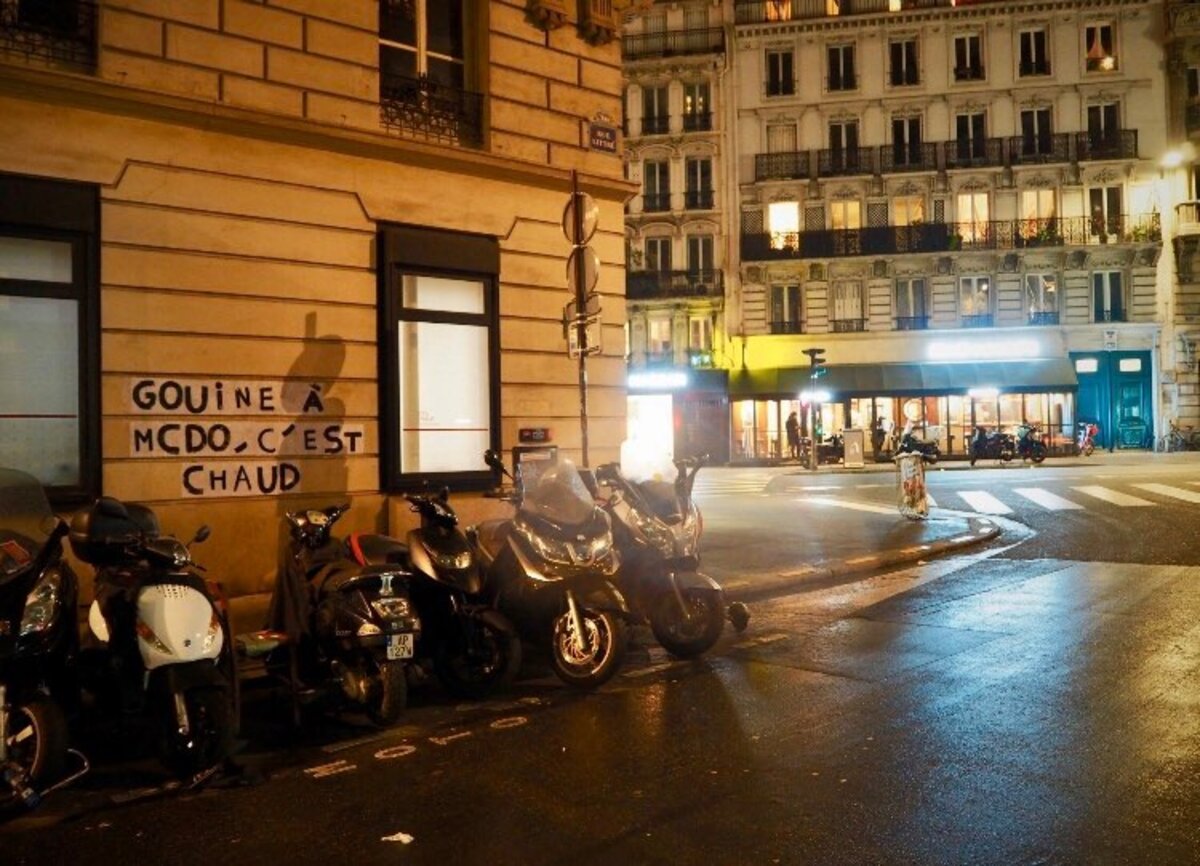
Enlargement : Illustration 1

The American chain, which is already the target of similar accusations in several countries and of a complaint lodged with the Organisation for Economic Co-operation and Development (OECD) - whose mission is to support policies that “foster prosperity, equality, opportunity and well-being for all” - declined to respond to Mediapart's detailed questions. Its management said in an email that “the chain refuses to make … any comment on individual situations, on internal or legal investigations that might be taking place. In the same way, McDonald's cannot endorse false accusations being made publicly about its employees.”
The America chain, whose slogan is 'Come As You Are', added that “McDonald's France utterly condemns all behaviour of a sexual or sexist nature, all behaviour which might violate a person's dignity through their degrading or humiliating nature, and all behaviour that would create an intimidating, hostile or offensive situation”.
Yet the accounts are damning, ranging from stories of inappropriate remarks or insults about someone's gender, origins, sexual orientation or trans identity, to the most serious sexual violence.
In certain restaurants, some of which are run as franchises, several witnesses report that comments of a sexual nature form part of daily life. “Sexism seems to be the common denominator of a lot of the discriminatory behaviour reported by the staff,” says the McDroits collective in a summary report which talks of a “particularly sexist atmosphere in the McDonald's company”.
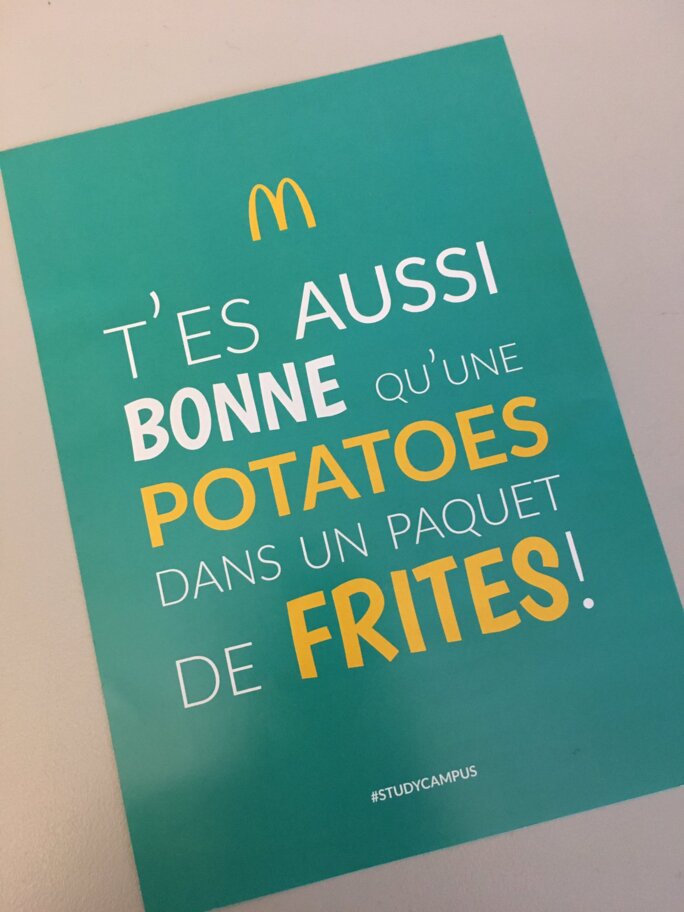
Enlargement : Illustration 2

At one McDonald's restaurant a customer care assistant described in a written statement to McDroits that her manager recruited her “just for the size of my chest”. An employee in another outlet said that a manager replied to her with very crude “sexual remarks”.
The McDroits summary states that “in several [restaurants] black and Arab employees and also women who wear a veil are subject to contempt and dehumanising [behaviour]”. The summary, seen by Mediapart, gives this anonymous example: “The new franchise owner said: 'We're going to whiten it all.' And he started to get rid of everyone, all the blacks and Arabs.”
Another witness said that the racist insult 'Bamboulas' – an English equivalent would be 'coons' – was frequently used in their restaurant.
“Comments stigmatising homosexual or bisexual staff are also part of the current practices at McDo,” states the McDroits summary.
'Laure' – not her real name – is 21 and works at a McDonald's restaurant in the Paris region to fund her studies. She is both disappointed and angry. “I have the feeling that they wanted to silence me,” she said.
Her story is hard to listen to. Since starting work there in 2018 she said she had never felt safe around her manager P. “He got very close to us. When he went past he often brushed past my breasts and my bum,” she told Mediapart. One of her colleagues 'Leïla' wrote to us: “Some staff have complained about his tactile attitude and many (even male staff) protest about his humiliating comments.”
In all, four staff from that restaurant have, anonymously, told a similar story.
Jean handed in his notice at the end of this summer, having worked in that outlet for three years. “In this restaurant there were often jokes about the physical appearance of women, staff and customers,” he said. 'Lilian', a colleague and friend of Laure, also witnessed P.'s behaviour on several occasions. “He also looked at and made inappropriate comments to other female colleagues,” she said.
One evening in December 2018 the restaurant's staff decided to have a drink after work and ended up at an employee's flat. According to the account of several people there, some of the group took part in games, including a drinking version of strip poker. Each time a player had no tokens left they had to remove an item of clothing.
In an account that she also told to several colleagues to whom Mediapart has spoken, Laure said: “I found myself alone with P. He spoke about my chest, he touched my breasts even though I repeated that I didn't want him to and pushed him off. I was afraid that he'd get his own back at work over my refusal but several times I told him I didn't want to. Then he went behind me. He took down my pants and fingered me, still without my consent. I was petrified, I could no longer speak.” P. left the party a few minutes later.
Questioned by Mediapart on several occasions, P. initially agreed to meet us before, in the end, refusing to answer any questions.
'Sorry for abusing you'
Laure said that the following day she cried as she described to one of her colleagues what had happened to her. But it went no further. It was only months later that she told other colleagues, as several of them have now told Mediapart. “What she was subjected to at work affected the rest of her life,” recalled Lilian. For a year and a half, during the time that she worked with that manager, she suffered anxiety attacks and had a great deal of difficulty in having sexual relations.
Leïla, who has worked at the restaurant for three years, recalled the day when Laure finally told her about the incident. “I knew that P. was very sexist in his behaviour but even so I was shocked,” she said, having listed the many situations in which she had felt uncomfortable at P's attitude.
One day in April 2019 Leïla had arrived at the restaurant with a new hair colour. She says P. said to her: “That's pretty. So when are we fucking?”
“I had already heard P. make remarks on several occasions about Laure's breasts,” said Jean. “Everyone responded to the inappropriate jokes and comments with an embarrassed laugh. I didn't stand up against it either and I feel very bad about it. We should have reacted, and by saying nothing it's as if we took part,” he said regretfully.
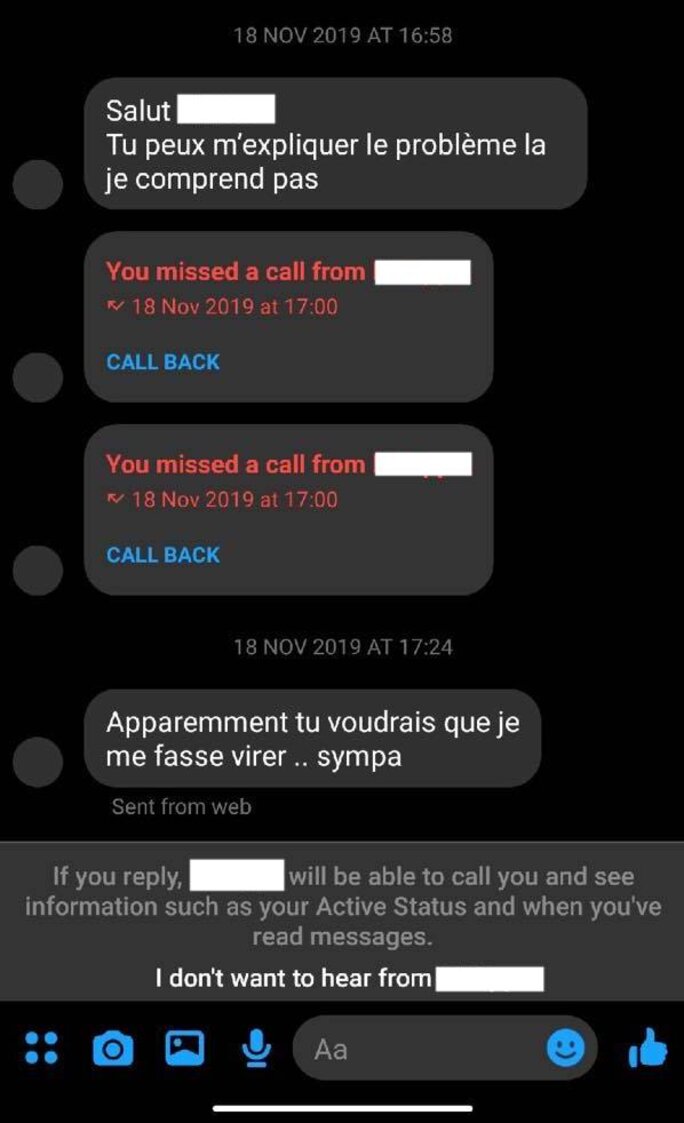
Enlargement : Illustration 3

“McDo likes to portray itself as one big family. So when there are sexist remarks no one, neither the managers nor colleagues, raises the problem, so as not to create a bad atmosphere. And it can be very violent,” said Mailys, a McDonald's employee in the Paris region since 2018 and spokesperson for McDroits.
The situation became more and more difficult for Laure at the restaurant in November 2019. She tried to start a group action against her manager's behaviour, which she could no longer bear. P. then contacted her via the Messenger app. Mediapart has seen the messages in which he writes: “Can you explain the problem to me? I don't understand … Apparently you'd like me sacked, nice”.
“It got the attention of the director,” Laure said. “I told him everything. I was afraid of making a complaint but I told myself that the director was going to help me. That was a mistake.” The restaurant's director decided to summon Laure and P. for a face-to-face meeting in December 2019 and they agreed. She arrived with a witness, a female colleague who soon afterwards became the employee in charge of the fight against sexual discrimination in the restaurant.
Laure explained her version of events. P. did not deny the facts. According to several sources he said “Sorry for abusing you”. But according to Laure he played it down. “He kept on repeating that there had been interplay, he said we were friends,” she told Mediapart.
The director gave the manager a lecture and then turned to Laure. She says that he told her that he would prefer that she stayed at the restaurant but that if it was too unbearable for her he could get her transferred to another outlet. The director was contacted many times but did not respond to Mediapart's questions.
“I didn't want to leave. It wasn't down to me to keep a low profile. I didn't want him to win,” Laure explained to Mediapart, her voice trembling. She had to work in the same establishment as P. until August 2020, and no sanction was taken against P. Eventually he resigned to take a better position in another restaurant.
Laure, meanwhile, has not reported her former manager to the police. “I was afraid of how I was going to be received at the police station,” she said. She still works in the same branch of McDonald's.
Her story, and those of her colleagues, strike a chord with many staff at the chain who, even though they work in different restaurants, and sometimes under different franchisees, tell of a very difficult workplace environment, and especially for young women.
Mediapart has spoken to many women who have worked at McDonald's who describe a very specific division of tasks. “In broad terms, if you were a white girl you were on the till. If you were a man and member of a visible minority you were in the kitchen. And if you were a bit old or considered an invalid you were relegated to the back kitchen chopping tomatoes,” recalled Élise, a former employee at a McDonald's restaurant in Paris. “It's always girls at the till and they get the pressure from the kitchen, from the managers and the customers,” said Angèle, who worked for McDonald's in the eastern city of Lyon.
Several former employees have told stories about the daily pressures and sexist remarks they faced at the chain on YouTube. Megane Celia reports the hellish experience that one of her female colleagues went through because she had hairy legs. Allison Maurel, who worked at McDonald's as a customer care assistant for two years, recalls being forced to wear a skirt and some degrading comments from customers. Offely K has uploaded a video entitled 'My experience at McDo: humiliation, intimidation, atmosphere'.
Two female employees to whom Mediapart spoke described a particular practice inside the McDonald's restaurants that hired them. They said that the male staff there classified the new arrivals according to their physical appearance. “I started along with three [other] girls. A second round of recruitment followed afterwards with two new female employees. 'You're a lot prettier than those who've just started' said some of the male staff who were already there,” said 'Sarah', who worked in the Paris region. “They had something like a chart and they divided up the girls at McDo who were not already part of a couple. It didn't make me laugh at all,” said 'Faïza', who still works at an outlet in Mulhouse in north-east France.
'Léa' well remembers her second day of work in 2017 at the Ville aux Dames branch of McDonald's near Tours in west central France, part of a large franchise run by Bernard Simmenauer, about whom Mediapart has written before (see here). An employee when she was just 18, she worked there 20 hours a week while finishing off her schooling, to help out her parents financially. The young woman had not had time to get used to the workplace environment when, in the changing rooms, a male colleague said to her: “The little young one with the big breasts, I wouldn't mind shagging her!”
Complaint to an industrial tribunal
During the six months that followed Léa received many comments about her appearance from several members of the team. “When I wore glasses one of them enjoyed saying 'woman in specs, hot at sex' while looking at me out of the corner of his eye. When I arrived at work, and before I got changed, comments were always made about my outfit saying that I was a bimbo that I was too dressed up, no matter how I was dressed.”
After six months Léa was worn down and quit for a new job. “I was so afraid that when I left I didn't even tell the female director the real reason I was going,” she said. The current woman director, who said she had started in June 2020, told Mediapart that “the entire team has since changed”, but refused to answer any questions, and referred us instead to McDonald's France, who also refused to comment.
Another former McDonald's worker, 'Jeanne', has decided to take action against her old employer. She worked on a full employment contract for ten years at an outlet in the Val d'Oise département or county north-west of Paris and has made a formal complaint to an industrial tribunal having reported one of her ex-colleagues to the gendarmerie in January 2020. In this formal complaint for “psychological bullying” – which Mediapart has seen – Jeanne describes the repeated comments about her physical appearance and the insults that former colleague F. is said to have uttered in front of her. She has already described some of these comments to journalists at France Inter radio.

Enlargement : Illustration 5

The restaurant where Jeanne worked is part of the Ouest-Parisien subsidiary of McDonald's France. This means that Jeanne is taking on not just a franchise, but a subsidiary of the French group itself. It is not the first time that employees at restaurants in this subsidiary have made complaints about “bullying”, said Gilles Bombard, the secretary of the CGT trade union branch representing McDonald's staff in the Paris region. “We've had it brought to our attention several times,” he said.
F., who did not respond for requests for an interview, has been an employee for four years in the same restaurant as Jeanne. At the start they got on well but soon, she said, the young man became too cheeky and tactile. She said that on several occasions she asked him to stop but without success.
In a report sent to human resources at headquarters, dated December 8th 2019 and seen by Mediapart, Jeanne wrote: “He continued to stay close to me, until one evening when I had reached the end of my tether with him and ending up shouting 'Shut your mouth!'” In the same document she said: “I noticed that once I had created this distance [between us] he became very hard and very nasty towards me.”
“Afterwards he called me a 'big whore',” Jeanne told the gendarmes when she was interviewed by officers on January 3rd 2020 as part of a preliminary investigation that was opened, and over which F. benefits from the presumption of innocence.

Enlargement : Illustration 6
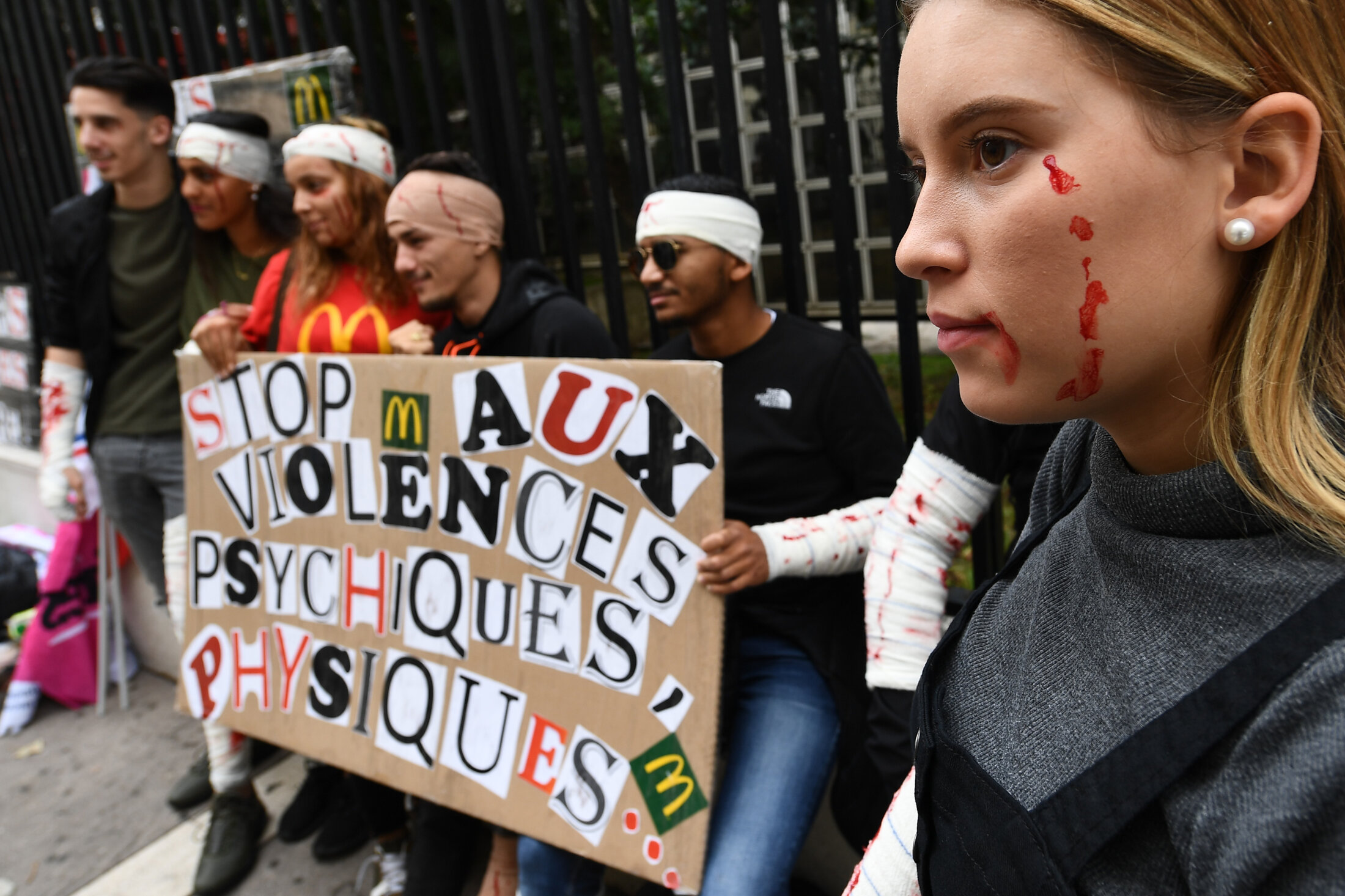
Jeanne was not the only person to have problems with F.'s behaviour; at least four women did, according to documents seen by Mediapart.
In 2018 Julie worked in the same restaurant for several months. “F. did not stop making fun of me because I was a lesbian,” she stated. “He told other employees in the restaurant that they had to watch out for me.”
In Jeanne's industrial tribunal case, prepared by her lawyer Adrien Thomas-Derevoge, three other employees have given statements about physical and verbal threats, according to written accounts seen by Mediapart. “My goal is to make McDo's girls cry,” he is said to have told Julie and Jeanne and others on regular occasions.
Once again, the management of a McDonald's subsidiary stood accused of failing to take enough action. In one of Jeanne's incident reports, which Mediapart has seen, she wrote: “I talked with the director, who told me that she was going to ask him to stop and explained to me that if he started again then it should be reported and she should be informed. Which did happen, as he did start again. And she did have to ask him again to stop.”
Several report incidents later, the employee said she continued to be marginalised inside the restaurant and that F. had received no sanction arising from her complaints.
Julie also said that the management had done nothing to protect her either. “I often cried, I was off work a lot. He was never punished for what he did to us,” she said.
Mediapart has tried, in vain, to contact the director on several occasions. Loïc Gloux, the directer of McDonald’s Ouest-Parisien subsidiary, stated: “The management of the McDonald's restaurant at Moisselles [editor's note, in the Val d'Oise département] has treated with the utmost seriousness the testimony of a former employee accusing a colleague of harassment.”

Enlargement : Illustration 7
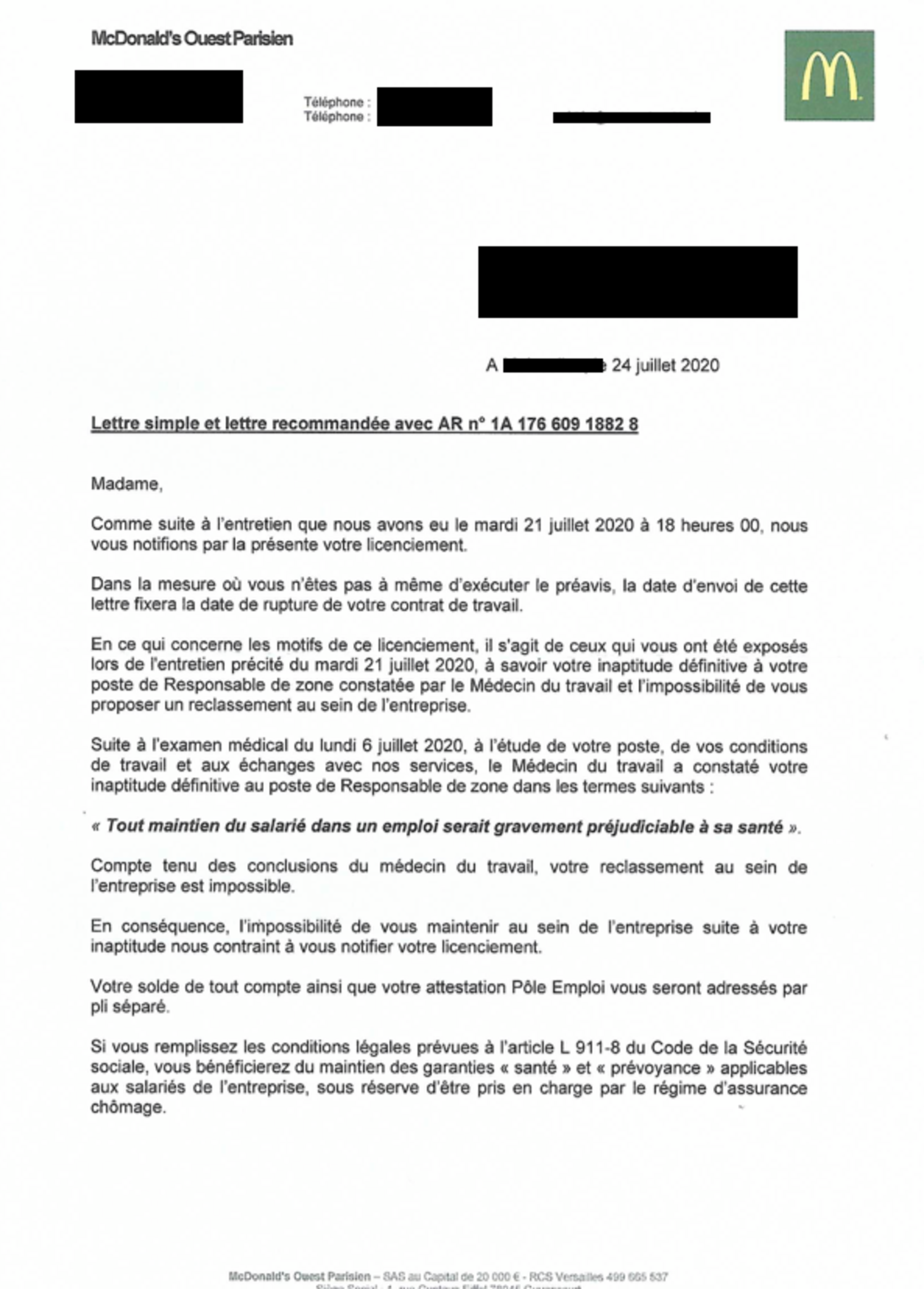
An internal investigation, carried out by two members of staff from the head office who are close to management, was started. According to Loïc Gloux this gathered 30 witness statements which the statutory workplace committee – the CSE – judged to be “all contradictory”. It thus ruled out “any harassment”. This approach has been criticised by the CGT trade union. “A case like that should have been dealt with directly by the CSE,” said trade unionist Gilles Bombard.
That view is shared by his colleague Kevin N’Keletela who is secretary of the CSE and works at a McDonald's in nearby Saint-Brice-sous-Forêt. He believes that the case has not been handled as well as it should have been. “They've done nothing to protect her. They did not fire F., he resigned. They let too many things go,” he said.
In December 2019, having broken down several times at work, Jeanne was signed off sick by her doctor. She has not returned to work since. On June 6th this year the company doctor said that Jeanne was unfit for work in any position in the company and she was made redundant.
The former employee now hopes that the industrial tribunal will help bring some release after the years of misery she went through at work. “She has shown great determination which has cost her a great deal. The difficulty of taking on a giant such as McDonald's when you're on an insecure contract and the long-windedness of the process means that many victims prefer to just move on,” said her lawyer Adrien Thomas-Derevoge.
Ana is one McDonald's worker who will not be taking her complaints to court as she feels she does not have the resources.
In December 2019 she started as an employee at a restaurant in Mulhouse in north-east France. She was on a permanent contract working 25 hours a week, and it was her only job. She signed the contract using the masculine name that was given to her at birth. But for several years she has identified as female.
“I haven't yet managed to change my name administratively,” she said. Her workmates called her Ana. Only the managers refused to do so, continuing to call her by her birth name and referring to her as a man. “I kept quiet and put up with it,” she told Mediapart. She said that the director had asked one of the female employees to call her by her birth name again.

Enlargement : Illustration 8

When contacted the director refused to comment and referred the issue to the owner of the franchise, Thierry Ganiole. He told Mediapart that he had respect for “all my staff, whatever their origin, gender or orientation”.
Ana thought more than once about taking legal action but, put off by the company's strength, she has not done so. “They'll pay a good lawyer and I don't have the resources,” she said. Since the Covid epidemic Ana has been off work and said that she will never return to work again in a McDonald's restaurant.
'The ketchup goes well with your red whore's lips'
'Léonardo', a young trans man and former McDonald's employee in the Toulouse region of south-west France, remembers his job interview well. “I arrived under my former female identity. The director told me: 'I hope that you like to do the cleaning and that you're not a princess because hygiene is import to us'.” He said that the director “ordered all his staff and managers never to call me Léonardo, otherwise [there would be] inevitable consequences”.
This account is confirmed by a former colleague 'Hélène', who added: “From the time I started at McDo I also noticed sexist behaviour on the part of a manager. When he came near colleagues he jostled us and never apologised. He called women 'miss' or 'mistinguette' [editor's note, after a famous French singer Mistinguett] as if our sole identity is to be a young woman without a name that's worth remembering.”
After two months, Léonardo's probation period was ended by the employer.
Qd je travaillais chez MC Do, ma directrice m'a ordonné de "venir maquillée comme une voiture volée, de porter un rouge à lèvre voyant car il faut mettre tes lèvres pulpeuses en avant, Pauline !" À l'époque, je ne me maquillais jamais. Encore moins au travail. 1/2 https://t.co/yOpygvHDGJ
— Pauline Rsl (@PaulineRoussel) October 11, 2020
Delphine, meanwhile, did not feel she was supported by her management in any way when she reported the “bullying” she said she had endured.
In September 2015, when she was studying between two exams, Delphine worked at a McDonald's restaurant in the Yvelines département west of Paris. “At midday I tended to be with colleagues for whom it was their only job. In the evening hey were older than that. Among them there was K., who was around sixty,” she said. K. became more and more persistent with Delphine and regularly told her that he wanted to go out for a drink with her, and to go to a restaurant.
Soon, said Delphine, these invitations turned into propositions and gestures of a sexual nature during working hours. “In the view and knowledge of some colleagues and managers, in the kitchen and in the break room, the shy flirting became full on,” she said. “Then, after my many refusals, it became harassment. In the middle of work K. would touch his genital area over his trousers while making lewd remarks.”
'Louis' has worked at the same McDonald's outlet for ten years and remembers K. “He was like that but not just with her, with lots of girls … he went up to colleagues and used to say to them 'Come on, kiss, kiss'. It kept happening and several girls complained about him,” said the employee, who pointed out that K. had not worked there for several years.
“In this McDo it wasn't just K. who made inappropriate comments. I know that one manager contacted colleagues and asked for some naked photos of them. He was fired but a long time afterwards. It was a widespread problem,” recalled 'Amélie', who worked in the same McDonald's, which belongs to a franchise owner.
Several days before she resigned Delphine decided to tell management. The women director gave her a standard form to fill in. The young woman sat at a table in McDonald's during a break and filled in the form, describing in ten lines the months of repeated comments and acts she had endured. No one ever got back in touch with her about it.
“At no time did I feel protected, either by the managers or the director,” she said. “As for the written complaint I made, I got the impression that I was putting a slip into a suggestions box that no one would ever open.”

Enlargement : Illustration 10
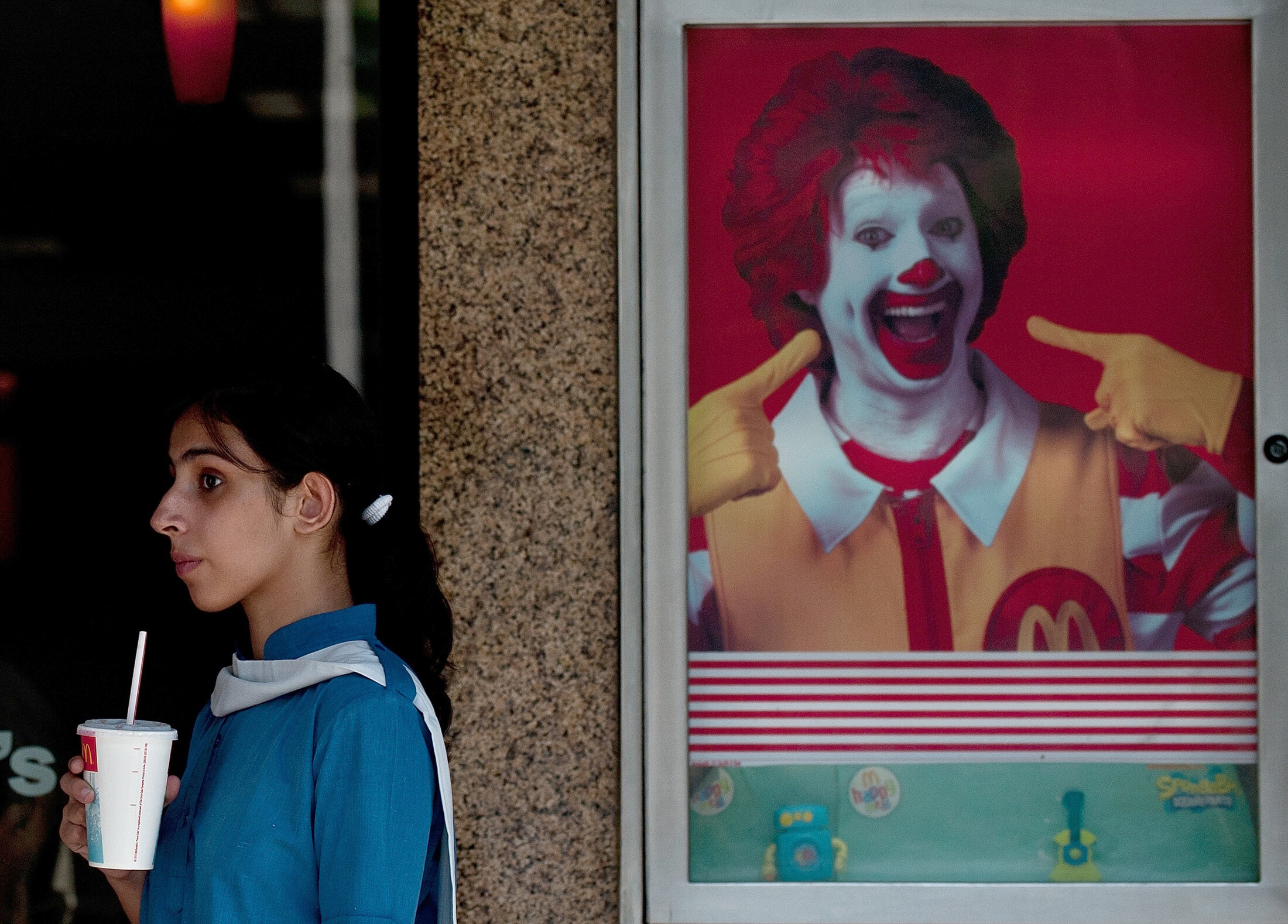
Some staff considered the sexism so rife in certain restaurants that they quit their job soon after joining.
'Shéhérazade' worked just a month at a McDonald's in Lyon in eastern France in 2017. First of all she felt that the way tasks were divided out was unfair. “The manager always got me doing the most thankless jobs, like cleaning. To assert their domination some managers used their power to assign certain tasks to us,” she said.
The young woman spoke about the disagreeable comments, the pressures and all the times that she left work in tears. Worn out, she decided to resign barely a month into her contract.
“One manager and a colleague organised a leaving ceremony by throwing ketchup on me. It was my last day at work and the manager told me: 'The ketchup goes well with your red whore's lips'.”
In the email that McDonald's France sent to us, the chain stated: “Meritocracy, equality of opportunity, respect for others and non-discrimination in all its forms are the cornerstones of McDonald's' values … These values are practised in our 1,490 restaurants based in every area, which reflect the full diversity of our country.”
-------------------------
If you have information of public interest you would like to pass on to Mediapart for investigation you can contact us at this email address: enquete@mediapart.fr. If you wish to send us documents for our scrutiny via our highly secure platform please go to https://www.frenchleaks.fr/ which is presented in both English and French.
-------------------------
The French version of this report can be found here.
English version by Michael Streeter


